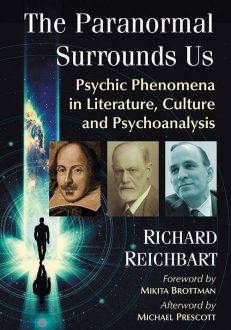The Paranormal Surrounds Us
Psychic Phenomena in Literature, Culture and Psychoanalysis
$39.95
In stock
About the Book
Shakespeare, Tolstoy, Joyce, E.M. Forster and Ingmar Bergman all made the paranormal essential to their depiction of humanity. Freud recognized telepathy as an everyday phenomenon. Observations on parapsychological aspects of psychoanalysis also include the findings of the Mesmerists, Jung, Ferenczi and Eisenbud. Many academicians attribute such psychic discoveries to “poetic license” rather than to accurate understanding of our parapsychological capacities. The author—a practicing psychoanalyst and parapsychologist, and a lawyer familiar with Navajo culture—argues for a fresh appraisal of psi phenomena and their integration into psychoanalytic theory and clinical work, literary studies and anthropology.
About the Author(s)
Bibliographic Details
Richard Reichbart
Foreword by Mikita Brottman
Afterword by Michael Prescott
Format: softcover (7 x 10)
Pages: 242
Bibliographic Info: appendices, glossary, notes, bibliography, index
Copyright Date: 2019
pISBN: 978-0-7864-9536-8
eISBN: 978-1-4766-3368-8
Imprint: McFarland
Table of Contents
Acknowledgments ix
Foreword by Mikita Brottman 1
Introduction 5
I. Psi Phenomena in Western Literature
One • Hamlet: The Tragedy of a Parapsychologist 13
Two • Psi Phenomena and Tolstoy 23
Three • E.M. Forster’s A Passage to India: Psi, Culture and Causality 35
Four • G.K. Chesterton and Ingmar Bergman: Artists of Magic and Psi Whose Intimations Proved Too Real 43
Five • Telepathy and Psychic Connections in James Joyce’s Ulysses: A Window into the Psychoanalyst’s World 60
II. Psi Phenomena and Psychoanalysis
Six • Psi and Psychoanalysis I: Rescuing Sisyphus 73
Seven • Psi and Psychoanalysis II: Rescuing Sisyphus Today 133
III. Psi Phenomena and Culture
Eight • The Navajo Hand Trembler: Multiple Roles of the Psychic in Traditional Navajo Society 163
Nine • Magic and Psi: Some Speculations on Their Relationship 175
Ten • Western Law and Parapsychology 192
Conclusion 201
Afterword by Michael Prescott 203
Appendix A: Jule Eisenbud: Explorer 209
Appendix B: Correspondence with Elizabeth Lloyd Mayer 213
Appendix C: A Cloak and Dagger Psi Mystery Story 218
Glossary 221
Index 225
Book Reviews & Awards
- Choice Outstanding Academic Title
- “A provocative and entertaining tour de force that challenges mainstream ways of conceptualizing both aesthetics and scientific inquiry…. It is not an exaggeration to call Reichbart’s oeuvre a masterpiece with the potential to shift paradigms…. highly recommended”—Choice
- “As the topic of unconscious communication makes its way toward the center of contemporary psychoanalytic debate, Richard Reichbart has presciently provided an exhaustive account of the concept, both within psychoanalysis and beyond. Having been immersed in the worlds of both psychoanalysis and parapsychological research, the author constructs a tour de force that coordinates the traces of psi phenomena across these and other disciplines. Moreover, not only has Reichbart written the definitive text on psychic phenomena as a topic of psychoanalytic inquiry, he has written a deeply insightful account of the relationship between psychoanalysis and science. At the heart of Reichbart’s argument are pressing questions about the limits of contemporary scientific thinking, and about psychoanalysis as an effort to operate at and to expand those limits. Popular audiences interested in the subject of psi phenomena will find a great deal by which to be fascinated herein, but it is the psychoanalytic clinician who will most benefit from such a rigorous encounter with aspects of analytic theory and practice that have been suppressed for too long.”—Jared Russell, author of Nietzsche and the Clinic: Psychoanalysis, Philosophy , Metaphysics
- “Since Freud’s famous dismissal of telepathy back in 1922, ‘…I have no opinion on the matter and know nothing about it,’ he sent a strong message to his followers. Despite his own conflict over the subject, he warned others not to pursue this realm any further, lest they discredit the field. Most psychoanalysts obeyed. Most, but not all. Richard Reichbart, almost a century later, tells us the story of these courageous dissidents who dare delve into ‘the occult.’ the ‘paranormal,’ the ‘psi phenomena,’ and the ‘extraordinary knowing.’ This meticulously researched work, destined to become a classic, is the definitive response to Freud. Fascinating and immensely readable, his sections on literature and culture provide the necessary foundation for building an interdisciplinary bridge, which moves us a giant step forward. In the true spirit of psychoanalysis, he shows us how a deeper appreciation of our own field’s past efforts to understand these ubiquitous phenomena will facilitate a better integration of new findings. This book is a must for all students, clinicians, and academics who want to or need to better understand and demystify our ‘sixth sense.’”—Ira Brenner, M.D., author of Dissociation of Trauma and Dark Matters—Exploring the Realm of Psychic Devastation
Ebook Availability
Amazon Kindle
Apple
B&N Nook
eBooks.com
Google Play
Kobo
Walmart





